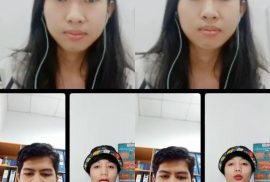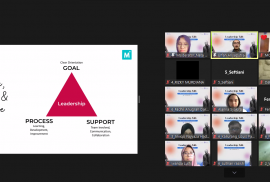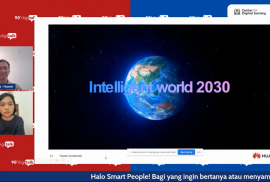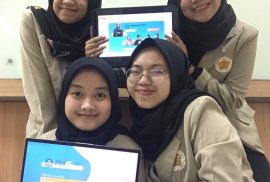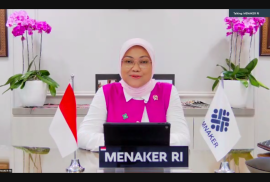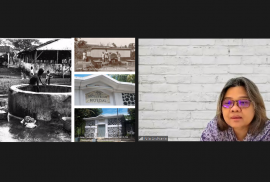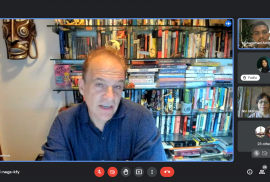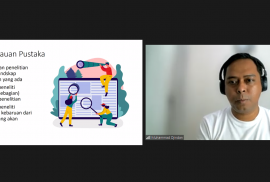Yogyakarta, October 1st 2021─FISIPOL Crisis Center (FCC) is back with the third FCC Talk on Friday (1/10). FCC Talk is one of the implementations of FCC education and socialization functions in order to prevent sexual violence on campus, especially at FISIPOL UGM. In collaboration with Unala Youth, a youth-friendly health service provider in Yogyakarta, this time the FCC Talk is also an effort to involve various parties in realizing a safe campus. Presenting Putri as a representative from Unala Youth, at this FCC Talk, Puspa and Yoseph from the FCC Education and Socialization Division talked about “Sexual Harassment: How Can We Stop It?” via an Instagram live broadcast session.
Yogyakarta, October 1st 2021─The Student Family of Public Policy Management (GAMAPI) Fisipol UGM held a LeadershipTalk webinar with the title “Be A Great Leader in the VUCA Era” on (01/10). This event was held by presenting resource person Erfan Ariyaputra, an expert in the field of Training and Development. On this occasion, the event was held online with discussion guides Nita Harmisa Dean and Arkananta Buwana, students of Public Policy Management (MKP) Fisipol UGM. This morning’s discussion was attended by 50 participants with various interesting discussions about leadership, ranging from basic definitions to various skills that can be developed to become characters that are able to adapt to changing times.
To explain AI in a simple way, Usman makes an analogy with AI as humans. Humans get data from various sensors, namely the five senses, in their bodies. Furthermore, the data will be sent to the brain to be studied. Today, there is a huge amount of digital data known as Big Data. The digital data is then processed and categorized by an “artificial brain” called machine learning and deep learning. Later, the categorization produces conclusions that can make the machine take a decision or action. “Artificial intelligence is a series, starting from obtaining, processing, collecting data, to drawing conclusions,” Usman explained.
Yogyakarta, September 30th 2021─The increasingly diverse social media platforms have had an effect on changing user attitudes, especially Generation Z. One of the reasons is that there are differences in the features of each social media platform so that users actively try to present their best image. This prompted a number of FISIPOL UGM students through the Student Creativity Program (PKM) to conduct research on the reality behind the diversity of social media features.
The PKM team in the field of Social Humanities Research, consisting of Maftukhatun Deritanti, Dyah Niken Rahmawati, Syifa Mahmudah, and Vina Idamatus Silmi raised the research title “The Multiple Faces of Social Media Users: The Use of Social Media in Building Image Among Generation Z”. With the guidance of a Communication Science lecturer, Lisa Lindawati, S.IP., M.A, they made observations on Instagram, Facebook, and Twitter social media accounts. “Through this research, it is expected to be able to describe how someone uses social media accounts along with the level of suitability of the circumstances shown by the user, identify a person’s motives in using social media, and provide a new perspective on active users in utilizing various social media platforms, as well as reduce user’s anxiety in using social media,” Maftukhatutun as the Head of the Research Team said.
Yogyakarta, September 30th 2021─The Institute of International Studies or IIS of the International Relations of UGM presented another Teacup ‘Talk and Think about IR’ Discussion at the end of September, on Thursday (30/9). In this fifth Teacup Discussion, IIS of IR UGM presented Azza Bimantara, a Masters Graduate from Corvinus University of Budapest, to present a topic entitled “Normative Aspects in Providing International Cyber Security Capacity Building Assistance: Experiences of Japan and South Korea”.
Yogyakarta, September 30th 2021─Institute Governance and Public Affairs Master of Public Administration or IGPA MAP FISIPOL UGM held a Webinar Policy Forum as part of the 66th Anniversary of Fisipol UGM on Thursday (30/9). Entitled “Searching for Policy Alternatives in the Conflicting Governance of Partnership Relationships in the Gig Economy”, this webinar brought together various stakeholders to discuss together, find a middle way for work relations issues in the form of partnerships that are often faced by online motorcycle taxis and couriers.
To open the discussion, the moderator said that the class will be divided into two sessions; lecture and the question and answer session. The first session which was the lecture was given by Nila Ardhianie where she talked about the basic function of water. Generally, water is a vital resource for human life because it is important for our body’s metabolism and the development of a city. The importance of water in a human’s life is equal to that of food. In this regard, both resources are important to fulfill human’s biological need, economical commodity, or cultural strength. The difference is that food is decentralized, locally grown, and is a part of the individual’s initiative. Meanwhile, water is organized by big bureaucrats, technical control, action and collective intervention in a system of centralized decision making.
Yogyakarta, September 29th 2021─The Covid-19 Pandemic affects the cases of violence against women, especially domestic violence. With this in mind, the Asean Studies Center (ASC) Fisipol UGM created the first series of ASEAN Talk-ReaLISM titled Reading, Learning, and Investigating Southeast Asia through Movies. The ASEAN Talk was held on Wednesday (29/9) and was opened by a documentary film titled Standing on the Edge of a Thorn: A Family in Rural Indonesia (2012). The movie that talks about poverty, mental health, and domestic violence was produced by Robert Lemelson, an American Anthropologist is also present in the event. Other than Robert Lemelson, ASEAN Talk also invited Udiana Puspa Dewi, S.S., MA. as a PhD Candidate in the University of Queensland, and Ninik Supartini, M.Si., as a researcher in the Robert Lemelson Foundation.
Yogyakarta, September 29th 2021─FISIPOL UGM Career Development Center (CDC) career webinar is back on Wednesday (29/9). The career webinar invited Lady Daratuka Aderof as the Talent Recruitment team in Glints Singapore to talk about “How to Prepare Your CV and Conquer the Interview”. Lady talked about two main topics which are how to create a CV and how to do an interview.
Lady started her speech by talking about the difference between CV and resume while talking about the contextual function of both documents, especially in relation to job recruitments in Indonesia. In both topics, Lady talked about the tips and tricks, do’s and don’ts, as well as the to-do lists in creating a CV and preparing for an interview. Other than that, Lady also explained several methods that one can use to enhance their CV and interview answers like using the ATS form for CVS and the STAR method ─situation, task, action, result─to answer interview questions.
Constructing an undergraduate thesis is something that needs to be done by all final year students. This is not an easy task to do, because a student has to use all their knowledge that they have accumulated in their university years. No wonder when constructing their undergraduate thesis a student can be confused because they do not know where they should start from.
To relieve students’ confusion, the Fisipol UGM Governmental Politics Student Corps (KOMAP) held an undergraduate thesis class that was in session from July to September. In the event, participants studied the different parts of a thesis, starting from the background to the research method. The speakers invited varied, starting from lecturers to Polgov UGM researchers. Students’ enthusiasm is also pretty high. There were always more than 50 students who attended the lectures.

